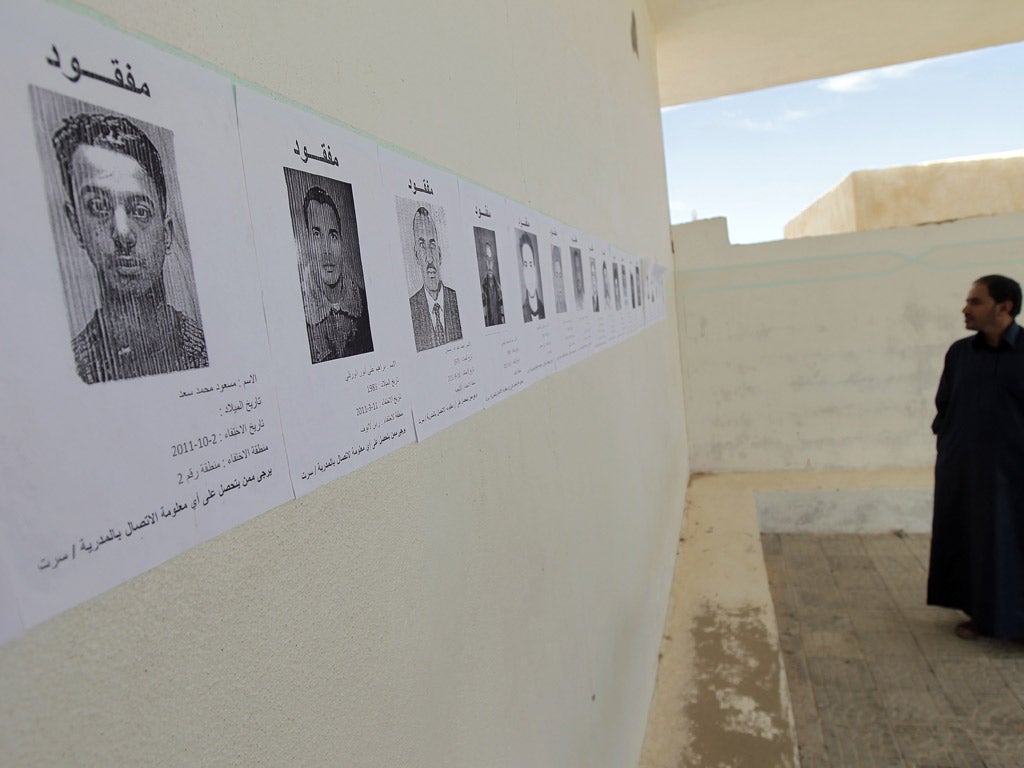10,000 still missing in Gaddafi's killing fields
The Ministry of Martyrs is compiling details of those that disappeared in Libya's civil war

Abdul Samia is searching for his brother. Abdelbaset disappeared in the final days of the Libyan civil war when he was in the town of Sirte, where Muammar Gaddafi made his final stand. The family's last contact with the 33-year-old café owner was on 26 September, a few weeks before the city fell to rebel forces.
Since then, their only sighting of him was in a television news report, where they glimpsed him surrounded by rebel fighters.
"We've tried everything", explained Abdul Samia. The family has visited all the prisons in Benghazi and Misrata. They've combed the lists of names of war dead and been through all of the pictures of unidentified people. There's a page online requesting information.
But every time someone calls to say they've seen his brother, it turns out to be someone else.
Abdul Samia isn't alone. Nine months after the end of Libya's civil war, friends and relatives are still searching for around 10,000 people who were lost at the front lines, trapped in Gaddafi's prisons, or simply snatched from the streets and never seen again.
At the Ministry for Martyrs and the Missing, a concrete block in a dusty suburb of Tripoli, Mervat Mhani is cataloguing the details of those who have disappeared. She was appointed to the ministry as the result of her campaigning work for the families of the missing.
She and her colleagues are now building a database of details and DNA samples from these families, that can be matched with samples from the bodies exhumed from the mass graves that continue to be discovered.
The process of exhuming the bodies and collecting and matching DNA to the families is long, difficult and expensive. Ms Mhani believes it will be years before the majority of bodies can be identified and DNA matches made.
Many of the missing date back to the Gaddafi regime. It was the quest for information about those who vanished inside his prisons that helped spark last year's uprising.
An estimated 1,270 political prisoners disappeared from Tripoli's Abu Salim prison on 29 June 1996. It later emerged that they had been shot dead inside the prison over the course of a single day after a riot sparked by the appalling conditions there. Their bodies have never been recovered. It was not until 2001 that Gaddafi's government first began informing families that their relatives inside the prison were dead.
This Friday was the 16th anniversary of the Abu Salim massacre and, for the first time, the families were able to gather at the prison for a memorial service for their lost relatives. Among them was Hajira Mohamed, an elegantly dressed young woman who is standing as a candidate in next week's elections.
She was there to remember her father, Mohamed. An academic, and author of religious books who got on the wrong side of the former Libya intelligence chief, Moussa Koussa, he was imprisoned in 1991, when she was 16 years old.
For years, her family negotiated with the regime. There were occasional glimmers of hope amid the uncertainty. "Every year, they said he was being released. We'd prepare the house and then he wouldn't come."
But, five years after his imprisonment, silence set in. The family would visit the authorities and plead for information but no more came. They believe he died in the 1996 massacre. "The most difficult thing was not knowing what happened", she said, her voice cracking. Her father's body has never been found.
Meanwhile, Abdul Samia continues his search. He has registered his brother's details at the Ministry for Missing People and his family has provided DNA samples. He is increasingly pessimistic, but says he cannot face giving up. "I just want to know if he is dead or alive. If he's alive, I can find him and go and stand by him. If he's dead then at least we can have a proper funeral for him.
"The odds are not good," he admits, "[but] how can I stop looking for him until I know what's happened?"
Subscribe to Independent Premium to bookmark this article
Want to bookmark your favourite articles and stories to read or reference later? Start your Independent Premium subscription today.

Join our commenting forum
Join thought-provoking conversations, follow other Independent readers and see their replies